The initial announcement of Star Trek: Discovery looked very promising. Unfortunately, the news has not been as good since then.
First of all, the first teaser showed some lackluster CGI effects, but I was willing to dismiss that as being evident of the show's early prouction. But then news kept getting worse. Bryan Fuller stepped down as the showrunner, CBS repeatedly stated that the show won't be an anthology (even though an anthology would be a great idea), and the show was delayed from January to March. Now it's been delayed again - this time indefinitely. The delays appear to be related with CBS's in ability to get its streaming service off the ground, delays in casting, and scheduling conflicts with those who have been cast.
But production has started, and the first teaser trailer has come out.
A behind the scenes teaser gives a look at uniforms, sets, possible ship redesigns, and the captain's chair.
The first thing that stood out to me is the tease of the new uniforms, which resemble a combination of the Star Trek: Enterprise uniforms, and the cadet uniforms from the rebooted Star Trek movies. But there's a huge flaw in this uniform: the breast badge is the delta shield. Since this is a prequel to the original series, this uniform is unlikely to belong to an Enterprise crew member, even though that delta shield was unique to the Enterprise in the original series.
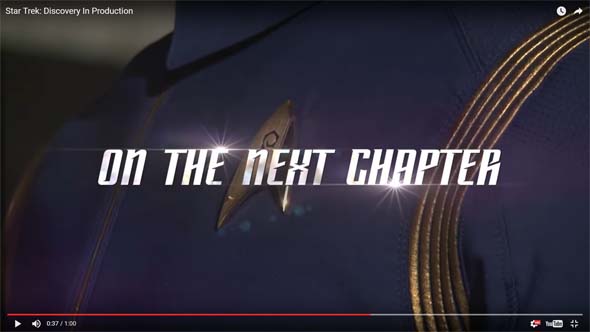
The Discovery teaser shows a delta shield badge on a pre-TOS uniform - which is a Star Trek faux pax.
In the Original Series, each ship, starbase, or installation had its own unique mission badges, similar to contemporary NASA missions. This was a detail that even Star Trek: Enterprise got right! But the Abrams reboot, and now the new Discovery series have broken with this detail, making the uniforms anachronistic within established series' canon.
Each ship, starbase, or installation in The Original Series had its own unique mission patch, inspired by NASA missions.
By the time of The Next Generation, Starfleet had adopted a single insignia for the use of its communicator badges, which was based on the Enterprise 1701's mission insignia. Of course, this badge was a piece of technology, rather than a simple patch on a shirt, so there could have been technical limitations that required the adoption of a single insignia.
UPDATE: FEBRUARY 10, 2017:
Since seeing the trailer and writing this post, it has come to my attention that I may have over-reacted to the insignia. The presence of this insignia may be a reference to the possibility that the lead character of the show is going to be the first officer from the original Star Trek pilot. This character was played by Majel Barrett (who later went on to protray Nurse Chapel), and this character was un-named, and was only called "Number One"). So this character would have previously served onboard the U.S.S. Enterprise with Captain Pike. Perhaps this insignia is on Captain Pike's uniform?
Either way, the fact that this insignia is still being used as the show's insignia bothers me, as the show is called "Star Trek: Discovery". The insignia for the show should be the Discovery's insignia, and the Discovery should have an insignia all its own. But this insignia is dangerously close to the original Enterprise's [More]
daf66755-c254-4474-af34-b9985da63c4e|1|5.0
Tags:Star Trek, Star Trek: Discovery, CBS, Paramount, Bryan Fuller, NASA, uniform, delta shield, mission patch, U.S.S. Discovery, anthology, Number One, Majel Barrett
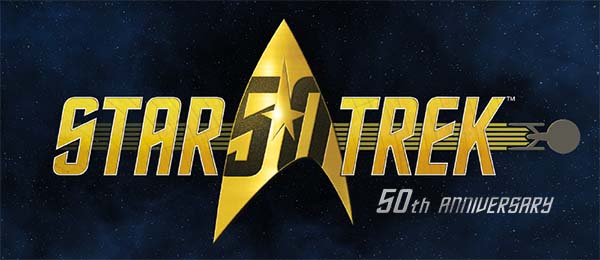
On September 8, 1966, a cultural revolution started. The first episode of a new science fiction television series named Star Trek premiered on NBC. This series broke new ground in the genre of science fiction by being one of the first series ever to present high science fiction concepts to television audiences, while also using its space adventures as allegories for contemporary social and political issues. While it presented itself as mindless space adventure in the same vein as Buck Rogers and Flash Gordon, it took a serious approach to science fiction that (at the time) was limited to literature like the novels of H.G. Wells and the stories of Isaac Asimov.
Star Trek wasn't the first serious science fiction television series. Shows like The Twilight Zone and The Outer Limits had existed for a almost a decade. But Star Trek differed from these series in that it depicted a revolutionarily positive and uplifting version of the future of humanity during the height of the paranoia of the Cold War. Humanity, according to Star Trek would overcome the threat of mutual destruction that the Cold War between the United States and the Soviet Union posed, and we would come out the other side with a spirit of cooperation and a desire to peacefully and benevolently explore the stars, exploring strange new worlds and seeking out new life and new civilizations.
Television science fiction was dominated by childish adventures like Buck Rogers
and more cynical anthology series like The Twilight Zone that drew off of Cold War paranoia.
The show was created by Gene Roddenberry, a former United States army air force pilot and Los Angeles police officer who eventually found his calling as a television writer and producer. He wrote and produced some police dramas and westerns before pitching his defining project: Star Trek. The show was picked up by Desilu Productions, a company that was run by Lucille Ball (yes, the titular actress of I Love Lucy) and her husband. The production of Star Trek was tumultuous. The show was canceled by NBC after its second season, only to be revived due to an unprecedented, fervent letter-writing campaign staged by its fans. It did not survive its third season, however, as Desilu Productions was rapidly running out of money, was forced to cut budgets, and NBC moved the show to the dreaded Friday night "death" slot. In an age before DVRs, or even VCRs, if people were out on the town on a Friday night, and they missed an episode of a show, then that episode simply went unseen.
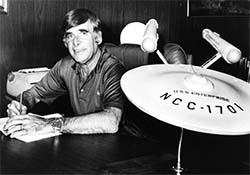
Gene Roddenberry's optimistic vision
of the future remains endearing.
The series eventually saw tremendous success after its cancellation due to its episodes being syndicated during the 1970's. It gained a cult following that grew and grew, setting up conventions that would come to draw thousands of attendees. Though not immediately apparent, Star Trek would grow to become one of (if not the) most successful science fiction properties in the world. The series is often cited by scientists, engineers, and astronauts as their inspirations for their careers, and the technology of the series has inspired many real-world technological innovations, such as wireless communication, mobile devices (in particularly mobile phones), speech-recognition software, and so on. Roddenberry became the first TV writer to receive a star on the Hollywood walk of fame, has been inducted into the Science Fiction Hall of Fame and the Academy of Television Arts & Sciences Hall of Fame, and was one of the first human beings ever to have his ashes carried into earth orbit... [More]
a36b33e8-1404-42b1-9723-a4759be0acee|2|5.0
Tags:Star Trek, Star Trek: the Next Generation, Star Trek: Deep Space Nine, Star Trek: Voyager, Star Trek: Enterprise, Star Trek: Discovery, Star Trek VI: the Undiscovered Country, Star Trek: Beyond, birthday, anniversary, science fiction, allegory, humanism, humanist, Gene Roddenberry, NBC, CBS, Fox, Paramount, Desilu Production, Lucille Ball, Cold War, Balance of Terror, The Measure of a Man, Kirk, Spock, Data, Gul Dukat, Seven of Nine, Star Trek the Experience, Las Vegas, Wallace Shawn, Grand Nagus Zek
I haven't had a good rant on this blog for a long while. At least, not one that isn't part of tearing apart a terrible game in a review. But I have something that's been really grinding my gears throughout all of 2016, and I need to say something about it: I really dislike advertising. I have an especially intense dislike of internet advertising practices. It's not the ads themselves that get on my nerves; it's the ways in which websites and advertisers chose to deliver them. So many websites are crammed full of ugly, intrusive, and obnoxious ads that really hurt the experience of the user trying to actually view and navigate the website.
Streaming services like Comedy Central insist on crashing the video in the event that there's even the remotest hiccup in loading one of the five advertisements that it must play during the four advertising breaks that it includes in its half-hour episodes. I routinely run into issues in which the pre-episode ads fail to load, and so the whole episode refuses to load, and I have to ctrl-F5 to reload the page until it selects a set of five advertisements that actually work. But then it gets to one of the mid-episode commercial breaks, and even if the advertisements do load and play, the actual episode refuses to continue. Sometimes, I can hit the "rewind 10 seconds" button to fix the problem. Other times, I once again have to ctrl-F5 to reload the page, sit through the pre-episode ads again (hoping they don't cause yet another failure), then skip past the ad break in the timeline, watch the mid-episode ads (and hope that they don't also fail), and then maybe I can continue watching the content. This is why I haven't seen an episode of The Daily Show in a couple months and have no idea if new host Trevor Noah has finally hit a stride yet. I have similar issues with CBS steaming, which is why I also haven't been able to watch much of Stephen Colbert's new late night talk show. Sorry Stephen, I love you, but CBS apparently doesn't want me to watch you.
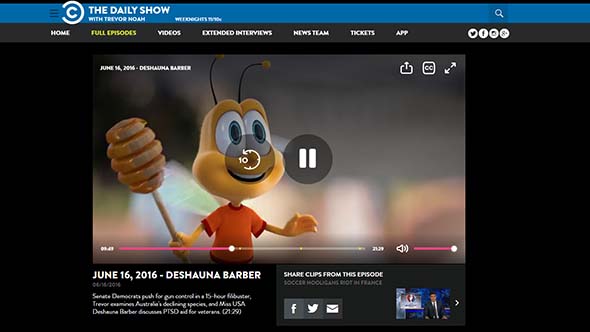
Issues with Comedy Central's ad-delivery abound: ads play over the actual content, their failure to load
prevents the content from playing, they have multiple ad breaks and not enough unique ads to fill them, etc.
To make matters worse, Comedy Central and CBS often doesn't even have enough distinct ads to fill up all these advertising breaks. I often see the same three or four ads in every ad break. Sometimes, the same exact ad will play back-to-back during the same advertising break!
Is this supposed to be punishment for not watching the show on cable TV? I actually do (at the time of this writing) have an active cable subscription, and that subscription does include Comedy Central and CBS. I could easily just DVR episodes of The Daily Show or Late Show with Stephen Colbert and watch them at home, but I prefer to watch them during my sit-in lunch breaks at work because it's just a more efficient use of time. Or at least, it would be, if it ever actually worked. Heck, on the DVR, I can just skip past the damned ads. I can't do that when streaming on the internet.
Comedy Central is far from unique in this regard. I've already pointed a finger at CBS as well, and this is one of the reasons that I'm not happy about Star Trek: Discovery being exclusive to CBS All-Access. I really don't want to pay for a streaming service to watch one show! Especially if it's still going to contain content-breaking advertisements that prevent me from even watching the show that I'm paying to watch... [More]
94497a0d-abb4-4a08-bedb-b4a985a495ef|2|5.0
Tags:advertising, advertisement, internet, streaming, video, content providers, internet service providers, cable, television, AdBlock Plus, The Daily Show, Trevor Noah, Stephen Colbert, the Late Show, CBS, all access, NFL, ESPN, Chicago Bears, football, Zero Punctuation, Disney, Disneyland, Amazon, Amazon Associates, Patreon, Kickstarter, crowd-funding, government, regulation
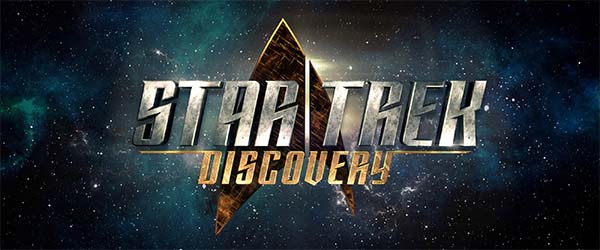
There's still a lot that we don't know about CBS's upcoming Star Trek series for its All Access streaming service. Early information and rumor was that the show would be run by Bryan Fuller (who formerly worked on the Deep Space Nine writing staff), that he had hired Nicholas Meyer (former director of The Wrath of Khan and The Undiscovered Country) to be the show's principle writer, and that the show might be a seasonal anthology series that would take place between the events of The Undiscovered Country and The Next Generation At least some of this information may be incorrect.
Earlier this year, the first teaser trailer was released. It also was not very forthcoming with specific information, but there were a few details that could be inferred.
The first teaser showed little detail, but seemed to imply a confirmation of a seasonal anthology.
The trailer begins in space over earth, but then warps away to exotic locations across space before revealing the show's logo and the tagline "New crews. New villains. New heroes. New worlds.". My interpretation of this teaser (assuming that there's an interpretation to be had) is that it is intended to show us that this new series will be shifting its attention away from Earth and out into deep space. That is promising.
The tagline definitely seems to support the idea of a seasonal anthology, since everything is plural. Granted, it could be a single storyline that just focuses on multiple ships' crews in parallel, but I hope that this is intended to verify that the show is a seasonal anthology in which each new season will be a completely independent, self-contained storyline separate from the previous season(s). However, Bryan Fuller himself has gone on the record as saying that the show is not an anthology series. Instead, he says that the show will "tell a Star Trek story in a modern way". By this, he means that each episode in a season will be a chapter of a larger story. This isn't entirely new to Star Trek, since both Deep Space Nine and Enterprise already had season-long arcs. But even then, those shows were still heavily episodic, with most episodes telling self-contained stories that can be enjoyed on their own without relying on having seen the previous episodes. Not so in this new series. Much like Game of Thrones, Walking Dead, Battlestar Galactica, and so forth, this new Star Trek series will likely require that its audience see every episode, in proper order, to be able to understand what's happening.
A few weeks ago, at Comic Con, we got something a little more concrete... [More]
974cbef6-843a-4ed8-87cb-1916bef03c83|0|.0
Tags:Star Trek, Star Trek: Discovery, CBS, all access, Bryan Fuller, Nicholas Meyer, anthology, seasonal anthology, science fiction, U.S.S. Discovery, Ralph McQuarrie, Star Trek: the Motion Picture, prequel, Star Trek: Phase II
Earlier this year, it was announced that CBS will be creating a new Star Trek television series to celebrate the franchise's 50-year anniversary. Very little was known about the series except that it would be under the leadership of Bryan Fuller (a former Deep Space Nine staff writer), and that it would premiere on CBS's All-Access streaming service. As one of Fuller's first actions, he made a lot of Trek fans very excited by hiring Wrath of Khan and Undiscovered Country director Nicholas Meyer to be the chief writer of the new series. These happen to be my two favorite Star Trek movies (with Undiscovered Country getting better each time I see it).
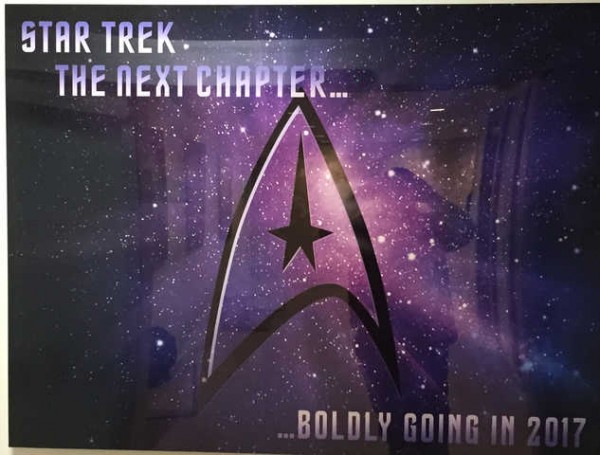
A leaked poster for the new Star Trek series.
The biggest questions were when would the series take place, and what would it be about. Many of the previous pitches for show ideas that I had read sounded terrible. Many sounded like really cheap fan-fiction concepts. Like the idea of a series about James Kirk's descendant becoming captain of a new Enterprise to save the Federation from an extra-galactic alien threat. Boy, that one sounded dumb.
I avoided talking about the topic of CBS's new series up till now because I wanted to reserve judgement until something more concrete about the show was announced. Well now, something has, and it has me very excited. According to rumors, Fuller and Meyers are producing a seasonal anthology series similar to the popular American Horror Story. This means that each season would contain its own self-contained, independent storyline that could explore any time period, characters, locations, or concepts from the entire series' canon. I've been saying for years that Star Trek would be a great fit for an anthology series. The canon is large and expansive enough that focusing it on a singular time, place, and characters feels very restraining and limits the types of stories that can be told.
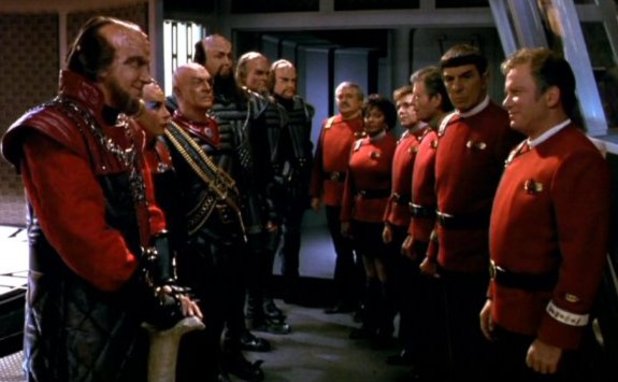
The first season will supposedly take place sometime after the events of The Undiscovered Country.
Of course, when I started pitching that idea to friends and anyone who would listen (don't know why I never blogged about it...), I hadn't conceived of a seasonal anthology. I was thinking more along the lines of a true anthology similar to The Twilight Zone or The Outer Limits. ... [More]
445daf46-75b8-4660-8c40-e9f50b68c654|1|5.0
Tags:Star Trek, CBS, all access, Bryan Fuller, Nicholas Meyer, anthology, American Horror Story, Star Trek II: the Wrath of Khan, Star Trek VI: the Undiscovered Country, Star Trek: Deep Space Nine, the Outer Limits, the Twilight Zone, science fiction, seasonal anthology, mirror universe
|

| 12 | | | | | | | 60 | | 11 | | | | | | | 55 | | 10 | | | | | | | 50 | | 09 | | | | | | | 45 | | 08 | | | | | | | 40 | | 07 | | | | | | | 35 | | 06 | | | | | | | 30 | | 05 | | | | | | | 25 | | 04 | | | | | | | 20 | | 03 | | | | | | | 15 | | 02 | | | | | | | 10 | | 01 | | | | | | | 05 |
|